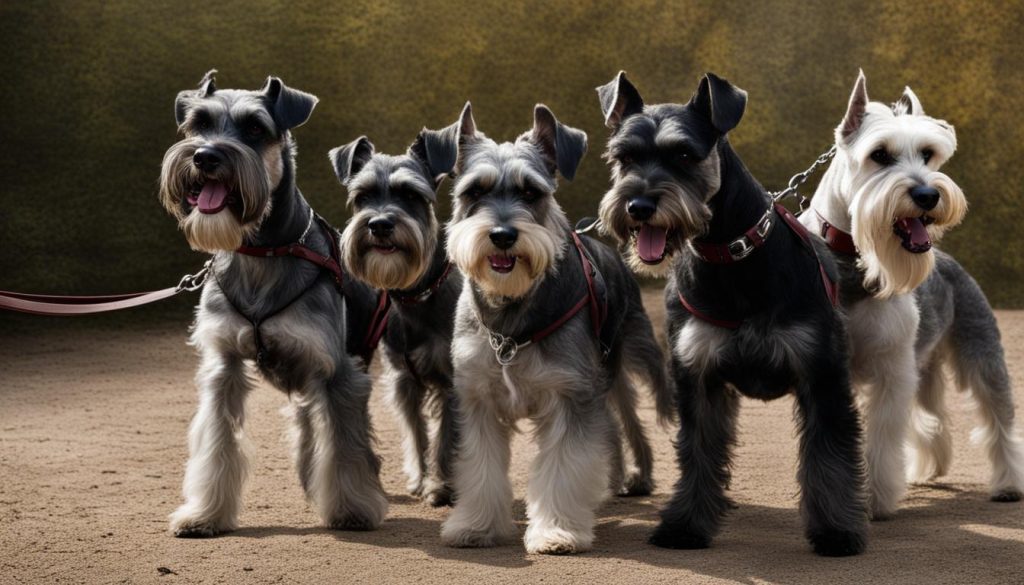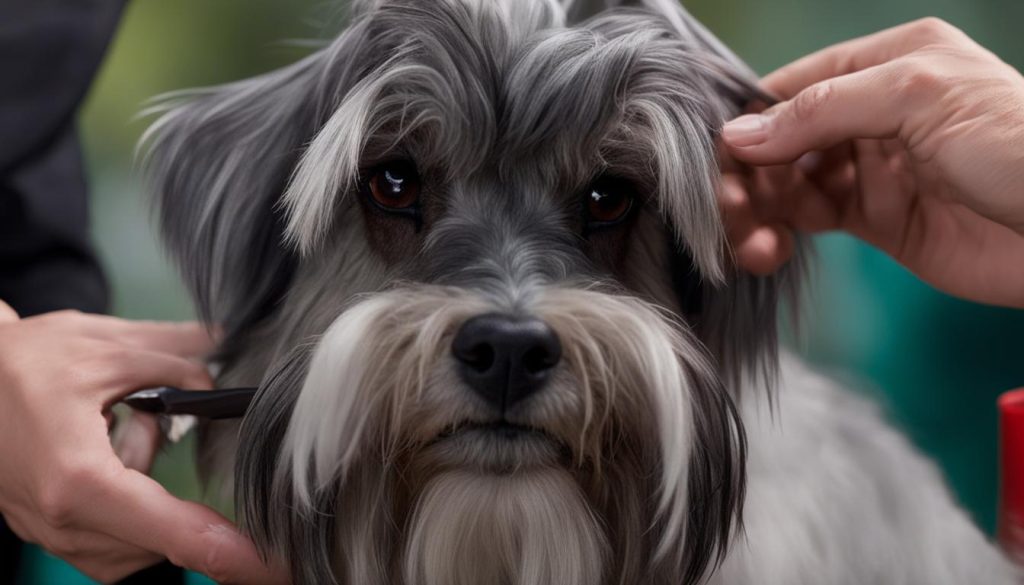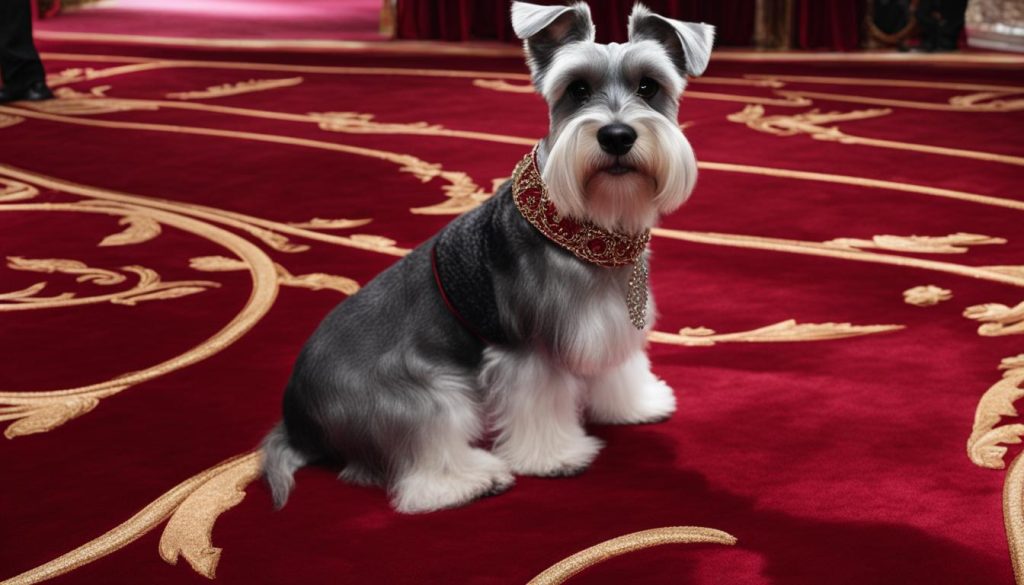When it comes to dog breeds, Schnauzers often get a bad reputation. They are known for their aggressive nature, stubbornness, and territorial behavior, which can make them challenging pets to live with. Understanding their temperament is crucial for owners who are considering getting a Schnauzer.
There are different types of Schnauzers, including Miniature Schnauzers and Standard Schnauzers, each with their own unique characteristics. While they can be loyal and protective, their challenging traits often overshadow their positive qualities.
In this article, I will delve into the reasons why Schnauzers are considered the worst dogs. From their aggressive nature and stubbornness to grooming challenges and potential health problems, we will explore the various aspects that make Schnauzers a difficult breed to handle.
However, it’s important to approach this topic with an open mind. While Schnauzers may have their downsides, they can still bring joy and companionship to the right owner who is willing to put in the effort to understand and manage their behavior.
Key Takeaways:
- Understanding the temperament of Schnauzers is crucial for potential owners.
- Schnauzers are known for their aggressive nature and territorial behavior.
- Their stubbornness can make training challenging.
- Grooming Schnauzers requires regular maintenance and can be time-consuming.
- Schnauzers are prone to certain health problems that owners should be aware of.
The Aggressive Nature of Schnauzers
When it comes to temperament, Schnauzers have a reputation for being one of the most aggressive dog breeds. While not all Schnauzers are angry all the time, their territorial nature can often make them come off as threatening. As a result, owners of Schnauzers may face challenges in managing their aggressive tendencies and ensuring the safety of those around them.
Schnauzers have a strong instinct to protect their territory, which can manifest as aggression towards strangers or other animals. This territorial behavior can be intensified if they are not properly trained and socialized from a young age. Without proper guidance, their aggressive tendencies can become problematic and may lead to issues such as biting, growling, or lunging at others.
To address the behavioral issues that can arise from Schnauzers’ aggression, owners must prioritize training and socialization. Consistency is key in teaching them appropriate behaviors and boundaries. Positive reinforcement techniques, such as rewards and praise, can be effective in shaping their behavior. It’s also important to provide them with ample opportunities for social interaction with other dogs and people to help them understand acceptable social cues and reduce their territorial instincts.
Understanding the aggressive nature of Schnauzers is crucial for owners to create a safe and harmonious living environment. By addressing their territorial behavior through proper training and socialization, owners can help their Schnauzers become well-behaved and balanced pets.

Table: Comparison of Aggression Levels in Different Schnauzer Breeds
| Schnauzer Breed | Aggression Level |
|---|---|
| Standard Schnauzer | Medium to High |
| Giant Schnauzer | High |
| Miniature Schnauzer | Low to Medium |
“Understanding the aggressive nature of Schnauzers is crucial for owners to create a safe and harmonious living environment.”
The Stubbornness of Schnauzers
When it comes to Schnauzers, their reputation for stubbornness is well-known among dog owners. Dealing with a stubborn Schnauzer can be a frustrating experience, but understanding the root of their stubborn behavior can help owners navigate their training difficulties and create a harmonious relationship.
Schnauzers are naturally independent and assertive dogs, which can make them more resistant to following commands or instructions. They have a strong will and can be easily distracted, making it challenging to keep their attention focused during training sessions. This inherent stubbornness means that owners need to be patient and persistent when teaching their Schnauzer new commands and behaviors.
Consistency is key when dealing with a stubborn Schnauzer. Establishing clear rules and boundaries from the beginning is important, as Schnauzers can quickly take advantage of any inconsistency or weakness in their owner’s demeanor. Reinforcing positive behaviors with treats, praise, and rewards can help motivate a stubborn Schnauzer to comply with commands.
Training Difficulties with Schnauzers
Training difficulties with Schnauzers can stem from their stubborn nature, but other factors can come into play as well. These dogs can be sensitive to harsh training methods or negative reinforcement, which can lead to further resistance and a breakdown in communication. Positive reinforcement techniques, such as clicker training or reward-based training, tend to yield better results with Schnauzers.
Another challenge with training Schnauzers is their intelligence and ability to quickly learn and adapt. While this may seem like an advantage, it can also mean that they become bored easily and lose interest in repetitive training sessions. To combat this, trainers should incorporate variety into their training routines, using different training techniques, toys, and environments to keep their Schnauzer engaged and motivated.
Overall, dealing with the stubbornness of Schnauzers requires patience, consistency, and a deep understanding of their temperament. With the right approach and positive reinforcement techniques, owners can effectively train their Schnauzer and establish a strong bond based on trust and mutual respect.

Grooming Challenges with Schnauzers
Schnauzers, known for their distinctive wiry coat, come with unique grooming challenges. Their thick, dense fur requires regular maintenance to keep it looking and feeling its best. Let’s explore the grooming tasks involved in keeping a Schnauzer looking sharp.
Grooming Tasks
- Regular brushing: Schnauzers require frequent brushing to prevent matting and remove loose hair. A slicker brush or comb is ideal for their wiry coat.
- Trimming: To maintain their signature Schnauzer look, regular trimming is necessary. This includes trimming the body hair and shaping the beard and eyebrows.
- Clipping: Schnauzers usually have a double coat, and clipping helps control the length and manage shedding.
- Facial hair maintenance: Schnauzers have long, luxurious facial hair that requires regular cleaning, trimming, and shaping to keep it looking neat and tidy.
These grooming tasks can be time-consuming and may require professional help. Many Schnauzer owners opt for professional grooming services to ensure their furry friends look their best. The cost of grooming services can vary depending on your location and the specific services requested.
Grooming Tips
To make grooming sessions more pleasant for both you and your Schnauzer, here are some tips:
- Start grooming sessions early: Introduce your Schnauzer to regular grooming from a young age to help them get used to the process.
- Use positive reinforcement: Reward your Schnauzer with treats and praise during grooming sessions to create a positive association.
- Be gentle: Schnauzers have sensitive skin, so be careful not to tug or pull on their hair while grooming.
- Check for skin issues: Regular grooming allows you to keep an eye out for any skin irritations, ticks, or other issues that may require veterinary attention.
Remember, grooming is not just about maintaining your Schnauzer’s appearance. It also plays a crucial role in their overall health and well-being. Regular grooming helps prevent matting, keeps their skin clean, and allows you to spot any potential health concerns early.
To summarize, grooming a Schnauzer can be a labor of love. It requires time, patience, and attention to detail. However, the result is a beautifully groomed dog that looks and feels great. Whether you choose to groom your Schnauzer yourself or enlist the help of a professional, regular grooming is essential to keep your Schnauzer’s coat healthy and their appearance top-notch.
| Grooming Task | Frequency |
|---|---|
| Brushing | At least once a week |
| Trimming | Every 6-8 weeks |
| Clipping | Every 6-8 weeks |
| Facial hair maintenance | As needed, usually once a week |

Common Health Problems in Schnauzers
Schnauzer breeds, including mini Schnauzers, are known to be susceptible to a variety of health problems. As responsible pet owners, it’s crucial to be aware of these potential issues and take the necessary steps to provide proper care and medical attention to our beloved Schnauzers.
Health Condition 1: Allergies
Schnauzers are prone to allergies, which can result in skin irritations, itching, and discomfort. These allergies can be triggered by environmental factors such as pollen or certain food ingredients. It’s essential to work closely with a veterinarian to identify the specific allergens and develop a management plan to alleviate the symptoms and improve your Schnauzer’s quality of life.
Health Condition 2: Epilepsy
Epilepsy is another common health concern in Schnauzers. It is characterized by recurrent seizures and can significantly impact their overall wellbeing. While there is no cure for epilepsy, medication and careful management under the guidance of a veterinarian can help control the seizures and minimize their frequency and intensity.
Health Condition 3: Diabetes
Schnauzers are also prone to developing diabetes, a metabolic disorder that affects the regulation of blood sugar levels. Diabetes can lead to various complications if left untreated, including weight loss, increased thirst and urination, and even life-threatening conditions. Regular monitoring of blood sugar levels, a controlled diet, and insulin therapy, if necessary, are crucial in managing diabetes in Schnauzers.
Other health problems that can affect Schnauzers include bladder stones, pancreatitis, and certain types of cancer. Regular check-ups, vaccinations, and preventive care are vital to identify and address any potential health issues as early as possible. By staying proactive in our Schnauzers’ healthcare, we can ensure they live happy, healthy lives by our side.
| Health Condition | Description |
|---|---|
| Allergies | Prone to skin irritations and itching due to environmental triggers or certain food ingredients. |
| Epilepsy | Recurrent seizures that can be controlled through medication and careful management. |
| Diabetes | A metabolic disorder that affects blood sugar regulation and requires regular monitoring and treatment. |
| Bladder Stones | Can cause urinary problems and may require surgical removal. |
| Pancreatitis | Inflammation of the pancreas that can lead to digestive issues and require medical intervention. |
| Certain Types of Cancer | Schnauzers are susceptible to certain cancers, such as mammary and melanoma, which may require specialized treatment. |
Remember, early detection and prompt treatment are crucial in managing the health problems that Schnauzers are prone to. By being proactive in our Schnauzers’ well-being, we can help them lead happy and healthy lives.

Living with a Difficult Schnauzer
Living with a difficult Schnauzer can be a challenging but rewarding experience. Understanding their temperament is key to creating a harmonious living environment for both you and your furry friend. Schnauzers are known for their strong-willed and stubborn nature, which can make training a bit more difficult compared to other breeds.
Patience and consistency are crucial when it comes to training a difficult Schnauzer. It’s important to establish yourself as the pack leader and provide firm yet positive reinforcement. Setting clear boundaries and using positive reinforcement techniques can help channel their energy and stubbornness into more desirable behaviors.
“Schnauzers are intelligent dogs and respond well to positive reinforcement. Using rewards such as treats, praise, and playtime can motivate them to learn and obey commands,” says experienced Schnauzer owner, Sarah Thompson.
In addition to training, socialization is another essential aspect of living with a difficult Schnauzer. Exposing them to different environments, people, and other animals from a young age can help reduce their territorial behavior. Regular walks in the park, visits to dog-friendly places, and playdates with other well-behaved dogs can contribute to their overall socialization and improve their behavior.
Table: Training Tips for Living with a Difficult Schnauzer
| Training Tip | Description |
|---|---|
| Be consistent | Establish consistent rules and routines to help your Schnauzer understand what is expected of them. |
| Use positive reinforcement | Reward good behavior with treats, praise, and playtime to motivate your Schnauzer to learn and obey commands. |
| Provide mental stimulation | Engage your Schnauzer in puzzle toys, obedience training, and interactive games to keep their mind active and prevent boredom. |
| Enforce boundaries | Set clear boundaries and consistently reinforce them to establish your role as the alpha and prevent unwanted behaviors. |
| Seek professional help if needed | If you’re struggling with training or behavior issues, don’t hesitate to consult a professional dog trainer or behaviorist. |
Living with a difficult Schnauzer requires patience, dedication, and a deep understanding of their unique temperament. With the right approach, training, and socialization, you can build a strong bond and create a harmonious living environment with your furry companion.

The Importance of Adoption over Buying
When considering getting a Schnauzer, it’s important to prioritize adoption over buying from a breeder or puppy mill. By adopting a Schnauzer, you not only gain a loyal and loving companion but also make a positive impact on the lives of shelter animals. There are already many Schnauzers waiting for their forever homes in shelters across the country.
Adopting a Schnauzer saves a life and helps reduce overcrowding in shelters. It also helps combat the unethical breeding practices of puppy mills, where dogs are often kept in deplorable conditions and bred purely for profit. According to the Humane Society of the United States, approximately 2.7 million adoptable animals are euthanized in shelters each year, simply because there aren’t enough homes for them.
When you adopt a Schnauzer, you provide them with a second chance at a happy and fulfilling life. These dogs may have had a difficult past, but with love, patience, and proper care, they can thrive in a loving home environment. Additionally, adopted Schnauzers often come with the benefit of being spayed/neutered, vaccinated, and microchipped, saving you the time and expense of these initial veterinary procedures.
| Benefits of Adopting a Schnauzer | Benefits of Buying from a Breeder |
|---|---|
| 1. Saves a life | 1. Ability to choose a specific breed or bloodline |
| 2. Provides a loving home to a shelter animal | 2. Potential for breeding or showing dogs |
| 3. Helps reduce overcrowding in shelters | 3. Opportunity to train and raise a puppy from a young age |
| 4. Supports ethical treatment of animals | 4. Ability to have more control over the dog’s early socialization and training |
Choosing adoption over buying is not only a compassionate choice but also a responsible one. By welcoming a rescued Schnauzer into your home, you become part of the solution to the pet overpopulation crisis and contribute to the well-being of animals in need. So, if you’re considering adding a Schnauzer to your family, I encourage you to visit a local shelter or rescue organization and give a deserving dog a second chance at a happy life.
The Positive Side of Schnauzers
While Schnauzers may have a reputation for being challenging pets, it’s important to recognize the positive qualities they possess. Despite their quirks, Schnauzers are loyal companions who can bring joy and enrich the lives of their owners. Here are some reasons to love Schnauzers:
- Loyalty: Schnauzers are known for their unwavering loyalty to their families. Once they form a bond, they will protect and stay by their owner’s side.
- Protectiveness: These dogs have a strong protective instinct, making them excellent watchdogs. They will alert their owners to any potential dangers or intruders.
- Good with Families: Schnauzers can be great family pets, especially with older children who can handle their energetic nature. They thrive in an environment where they are part of the family pack.
- Versatility: Schnauzers were bred for various tasks, such as hunting, herding, and guarding. This versatility means they can adapt well to different lifestyles and activities.
- Intelligent: Schnauzers are highly intelligent dogs. With proper training, they can learn commands quickly and excel in various activities, including obedience, agility, and even therapy work.
It’s important to remember that every dog, including Schnauzers, is unique. While they may have certain challenges, their positive attributes can make them wonderful companions for the right owner. With patience, training, and love, Schnauzers can thrive and bring a lot of happiness to their families.

“A Schnauzer’s loyalty and protectiveness make them excellent companions for families.”
Wrapping Up
I understand that some may consider Schnauzers to be the worst dogs due to their challenging nature, but it’s important to approach this topic with an open mind. Every dog, including Schnauzers, has its own unique personality and temperament. By understanding the breed characteristics and taking the right approach, owning a Schnauzer can be a rewarding experience.
When it comes to Schnauzers, proper training and socialization are key. Their aggressive nature can be managed through consistent training methods and positive reinforcement. Additionally, their stubbornness can be addressed by using patient and firm techniques. With time and effort, owners can create a loving and well-behaved relationship with their Schnauzer.
While grooming Schnauzers may require extra time and effort, it’s important to remember that their distinctive looks are part of their charm. Regular brushing, trimming, and clipping will help maintain their wiry coats and prevent matting. By embracing their grooming needs, owners can keep their Schnauzers looking their best.
Although Schnauzers may be prone to certain health issues, prompt medical attention and regular check-ups can help monitor and manage these conditions effectively. Being proactive and proactive about their health needs will ensure a happy and healthy life for your Schnauzer.
FAQ
Why are Schnauzers considered the worst dogs?
Schnauzers are often considered the worst dogs due to their aggressive nature, stubbornness, and territorial behavior.
Are Schnauzers aggressive?
Yes, Schnauzers are known to be one of the most aggressive dog breeds. They can come off as threatening due to their territorial nature.
Are Schnauzers difficult to train?
Yes, Schnauzers are known to be strong-willed and stubborn, which can make them challenging to train.
What grooming challenges do Schnauzers present?
Schnauzers have a thick, wiry coat that requires frequent grooming, including regular brushing, trimming, and clipping. Their facial hair also needs to be regularly maintained.
What are the common health problems in Schnauzers?
Schnauzers are prone to several health issues, including allergies, epilepsy, diabetes, and more.
How can I live with a difficult Schnauzer?
To live harmoniously with a difficult Schnauzer, it’s important to have a deep understanding of their temperament, provide proper training, socialization, and exercise, and practice patience and consistency.
Should I adopt a Schnauzer instead of buying one?
Yes, it is highly recommended to prioritize adoption over buying from a breeder or puppy mill to give a Schnauzer a second chance at a happy life and help reduce overcrowding and euthanasia rates in shelters.
What are the positive qualities of Schnauzers?
Schnauzers are known for being loyal, protective, and good with families. They have a rich history and were bred for various tasks, making them versatile and capable dogs.
Is owning a Schnauzer worth the challenges?
Every dog is unique, and while Schnauzers can present challenges, understanding their behavior, training them effectively, and providing proper care can help mitigate difficulties and make owning a Schnauzer a rewarding experience.






